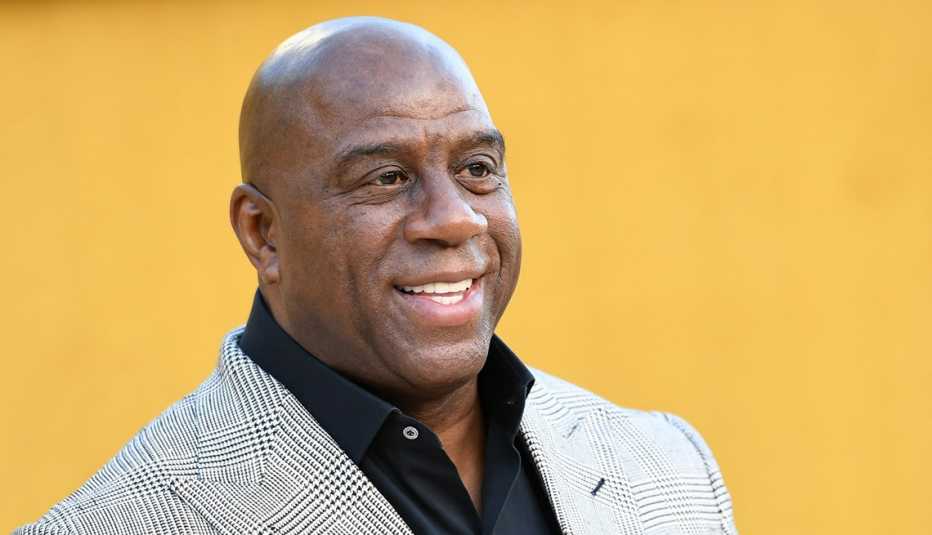In basketball lingo, a “triple-double” occurs when a player achieves double-digit numbers in a single game in three of five statistics: points, rebounds, assists, steals and blocked shots. Though Oscar “The Big O” Robertson often achieved the feat in the 1960s, it was Magic’s penchant for regularly pulling off the statistically improbable that caused Lakers PR director Bruce Jolesch to reportedly coin the term. During his time in the NBA, Johnson was responsible for just over one-quarter of all the league’s triple-doubles, and there was a steep drop-off in them after his retirement. Johnson ranks third in regular-season triple-double leaders with 138 (after Russell Westbrook’s 194 and Oscar Robertson’s 181), and he’s the all-time leader for postseason games, with 30.
4. His sense of showmanship made the NBA cool even for non-basketball fans
Known for his wide smile, his charisma and his lightning-fast style of play, Johnson ushered in a new era for the NBA marked by a flair for the fun. “The Showtime Lakers, as the team was known, set a new template for how professional basketball came to be viewed on and off the floor,” Sopan Deb recently wrote in The New York Times. “The team crossed over into pop culture consciousness in a way no NBA franchise had.” And it had a financial impact as well on the league, which was facing low attendance numbers and falling ratings. “They helped save the league,” Deb says. Quincy Isaiah, the young actor who plays Johnson in HBO's Winning Time, told the Times, “He wanted to put on a show. But he definitely wanted to make everyone in that arena feel good while watching, including his teammates.”
5. And his rivalry with Larry Bird didn’t hurt
Larry Bird (left) of the Boston Celtics poses for a portrait with Magic Johnson of the Los Angeles Lakers on Jan. 1, 1983 in Los Angeles, California.
Andrew D. Bernstein/NBAE via Getty Images
One of the fiercest rivalries in NBA history kicked off before either of the players entered the league, when Larry Bird’s Indiana State took on Magic Johnson’s Michigan State in the 1979 NCAA Championship Game. The game attracted an estimated 40 million TV viewers — by some counts, the most-watched game in American basketball history. Michigan State ultimately came out on top, 75 to 64, and the two rivals were immediately drafted to two storied franchises, the Lakers and the Celtics. They represented so much more than just the game: Black vs white, urban vs rural, West Coast vs East Coast. They faced off against one another in three NBA finals, and together earned half the MVPs given out during the 1980s. The rivalry lit a fire under the waning league and made the NBA must-see TV. As Andy Katz wrote on ESPN.com, “When Magic and Bird entered the league in 1979, the NBA Finals were broadcast on a tape-delayed basis. You had to stay up until 11:30 p.m. to watch Brent Musberger call the play-by-game. The league was riddled with drug problems and attendance was sagging.” Katz argues that the duo “gave the NBA star power,” and the media ate up the rivalry narrative.
6. He later became one of America’s most influential Black business leaders
(Left to right) Stan Kasten, Mark Walter, Magic Johnson, Peter Guber and Todd Boehly at a press conference introducing them as the new owners of the Los Angeles Dodgers on May 2, 2012 at Dodger Stadium in Los Angeles.
Chris Williams/Icon SMI/Corbis/Icon Sportswire via Getty Images
On the 2013 special Advancing the Dream: Live From the Apollo, Johnson told a story about cleaning offices as a teenager: “I would go clean the first six floors, but on the seventh floor, that’s where the CEO’s office was, so I would bust in and I would pretend like I was the CEO, and I would put my feet on the desk. I grew up poor, but I didn’t have poor dreams.” Rather than blow his fortune on frivolous purchases, Johnson has a reputation for being one of the most business-savvy former athletes out there, with a current net worth estimated at $600 million. As part of a group of investors, he bought the Los Angeles Dodgers and the WNBA team, the L.A. Sparks, but he isn’t only interested in big-ticket purchases: According to FranchiseWire, Johnson also owns Burger Kings, TGI Fridays, 24-Hour Fitnesses and a slew of Starbucks. “We, as Black people, had never really understood generational wealth and passing that wealth on,” he said in a Guardian interview last year. “We’re finally starting to understand that. It empowers our community… Now these kids dream that they can become not only a basketball player or a football player, but they can become a businessman. So that’s what’s important, that we have power and that we have a seat at the table.” In 2020, he put his money where his mouth is, when his EquiTrust Life Insurance Co. donated $100 million in capital to fund federal loans for minority- and women-owned businesses during the pandemic.
Nicholas DeRenzo is a contributing writer who covers entertainment and travel. Previously he was executive editor of United Airlines’ Hemispheres magazine and his work has appeared in the New York Times, Conde Nast Traveler, Travel & Leisure, Sunset and New York magazine.





































































More on Entertainment
Barrier Breakers: Black Athletes Who Paved the Way
African American sports figures talk about the stars who inspired themKareem Abdul-Jabbar Continues His Fight for Racial Equality
The NBA All-star uses his platform to champion social justice